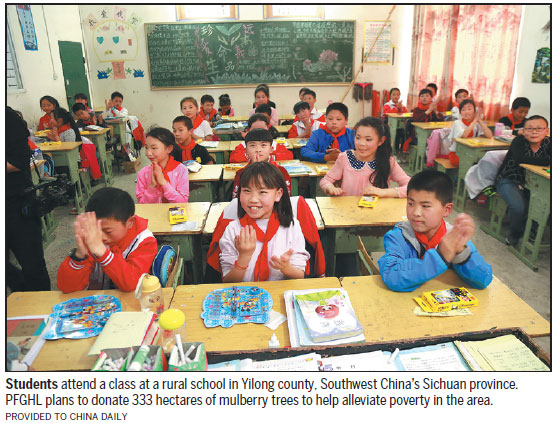Hong Kong-headquartered textile and garments supplier Profits Fund Global Holding Ltd donated 333 hectares of mulberry trees to a county in Sichuan province, alleviating local poverty by developing organic silkworm growing, also known as sericulture.
In celebration of Tree Planting Day on March 12, executives from the clothing company and officials in Yilong county planted 3,000 mulberry trees in the newly established mulberry cultivation and silkworm rearing area.
PFGHL plans to plant more trees and develop organic sericulture this year in the village of Xiangtanzi in Yilong, a poor county located in Sichuan.
"The goal of this charity event is to teach farmers how to become prosperous on their own. Like the old saying goes, 'if you give a man a fish, you will feed him for a day. If you teach a man to fish, you will feed him for a lifetime,'" said Hui Yui Sang, president of PFGHL.
"We offer farmers land and techniques for organic mulberry cultivation and silkworm rearing. In this way, they can earn wealth through their own work, to get rid of poverty, which, in my perspective, is the essence of poverty alleviation," Hui said.
In addition, the company plans to work alongside universities, such as Hong Kong Polytechnic University and Chengdu Textile College, in research and development in innovative projects such as water-free dying, producing high quality silk fabrics for China and the rest of the world.
To improve the living standard of local residents, PFGHL donated an extra 500,000 yuan ($79,275), working with the local government to build a kindergarten in Yilong county that will offer a better educational environment for students and teachers.
The area of the new kindergarten will reach 400 square meters, and more than 220 students are expected to be enrolled.
PFGHL also donated 100 million yuan to establish another organic silk base in Yilong county, making full use of the county's geographical advantage to generate income for local famers.
Chen Zhi, deputy mayor of Yilong county, said that the county has more than 300,000 migrant workers, and the number of people who are willing to work at home has dropped over the years.
"Now, with the launch of the organic silk area, more and more young people come back to Yilong to learn the techniques for organic mulberry cultivation and silkworm rearing, and to work in the base. They get reasonable salaries. Meanwhile, farmers also make money by renting their land," he said.
In the coming three to five years, the company plans to invest 300 million to 500 million yuan to develop more than 2,000 hectares of land, and meanwhile prepare for weaving and dyeing plants that are expected to be ready for production by 2020.
"By 2029, our investment into developing regenerative agriculture will exceed 1.5 billion yuan, with a total silk production of more than 200 metric tons. We aim to help raise farmers' incomes fourfold, and increase the county's GDP to 1.2 billion yuan," Hui said.

